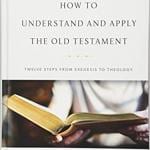John H. Walton and J. Harvey Walton.
The Lost World of the Israelite Conquest: Covenant, Retribution and the Fate of the Canaanites.
Downers Grove: IVP Academic, 2017.
Available at IVP.
Review by Dr. Jill Firth
The Israelite conquest of Canaan under Joshua is one of the most troubling biblical narratives for modern Western readers. ‘Is God some kind of moral monster that he would commit or condone genocide?’ This question distresses sceptics and Christians alike, and has motivated John Walton and his son, J. Harvey, to take a fresh look at the biblical text and at ancient Near Eastern backgrounds. After some initial writing by J. Harvey Walton, it became clear that the book could become part of the Lost World series, which follows the procedure of a list of propositions which seek to logically demonstrate the argument, backed up with research into the Hebrew text and cultural context of the topic. Walton explains that the Conquest requires a more technical treatment, with some details on the IVP website. The book includes scholarly footnotes, a subject index and a scripture index.
Part 1 contains three propositions about Biblical interpretation, and Parts 2, 3 and 4 look more closely at the Canaanites. The most controversial section is Part 5, a redefinition of the Hebrew word ḥerem. Rather than the usual translations such as ‘destroy totally’ (NIV) or ‘devote to destruction’ (ESV), the Waltons suggest a reference to ‘removal of something from human use.’ It is clear in the Old Testament that sometimes ḥerem involves a transfer of ownership rather than destruction, as in the field dedicated to the Lord which is removed from human use then reallocated by God to the priests at the jubilee (Leviticus 27.21). Thus land dedicated to God cannot be used for other purposes by the previous owners. The Waltons invoke other texts in regard to humans who are offered to God, such as the firstborn (Exodus 13.12–13; Numbers 18.15–17) to argue that humans ‘must be redeemed’, and brings this into dialogue with Leviticus 27.29, where slaves cannot be ransomed. Noting the distinction between cities and their inhabitants (Joshua 6.17), the Waltons argue that the people of the cities are driven out (grš) rather than killed, then God, the owner of the city, allows the Israelites to live there. Proposition 16 argues helpfully that ‘Ḥerem against Communities Focuses on Destroying Identity, Not Killing People of Certain Ethnicities.’
Ancient Near Eastern background is important in Proposition 17, ‘The Wars of Israelite Conquest Were Fought in the Same Manner as All Ancient Wars.’ The Mesha Inscription records the claim that the Moabite god Chemosh claimed that a reconquered city is ‘ḥrm for Ashtar-Chemosh’. This and other following propositions note that the territory so conquered by Israel now belongs to God, rather than to the Israelite king.
Proposition 21 asserts ‘The Application of Ḥerem in the New Covenant Is Found in Putting Off Our Former Identity and Surrendering to the Lordship of Christ, and Therefore Ḥerem Has Nothing to Do With Killing People.’ This chapter stresses that communities outside Canaan were not subject to ḥerem in Old Testament times. In New Testament times, the old self is to be driven out from the Christian, and the Christian community is to be concerned with wholehearted devotion to God. They conclude that today, the concept of ḥerem is to be directed inward to Christian holiness, and not outward to the non-Christian community: ‘Christians are not supposed to ḥerem infidels and nonbelievers for the sake of purging the world from apostasy.’
A short review cannot include all the insights and arguments of the book. The interested reader is invited to read The Lost World of the Israelite Conquest and to consider the arguments for themselves. John Walton has drawn on his expertise in Hebrew and the ancient Near East to develop his son’s interesting thesis. The book is suitable for students, lecturers and other thoughtful readers.
Jill Firth is a Lecturer in Hebrew and Old Testament at Ridley College in Melbourne. Her current research is in Psalms and Jeremiah.












